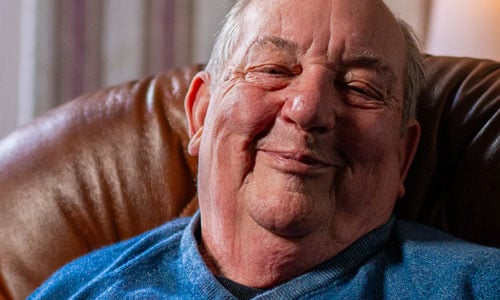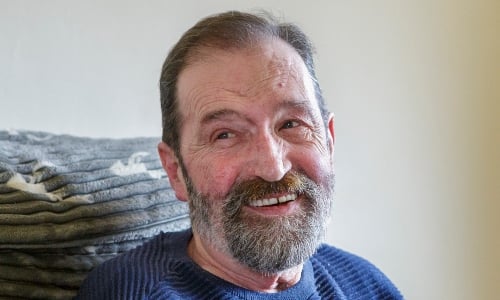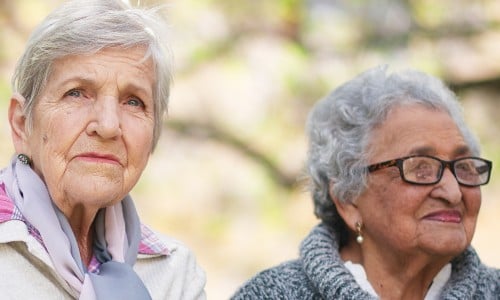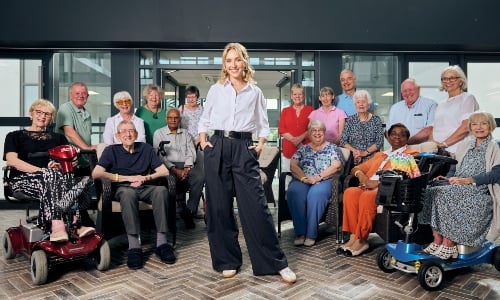Terry lives with a condition known as Degenerative cervical myelopathy (DCM). DCM affects 5% of people over 40, but as Terry explains, hardly anybody's heard of it.
DCM is caused by degeneration of the spine in the neck, which injures the spinal cord. Early symptoms include neck pain and weakness, often on one side of the body.
Having worked as a delivery driver, Terry developed compression on his spinal cord called cervical stenosis. This can cause squeezing of the spinal nerves or the spine itself, leaving people experiencing severe stiffness, back pain and difficulty walking. Terry has had arthritis since 2016, which started in his hips and then spread to his neck, resulting in DCM.
“The arthritis in my neck caused something called cervical stenosis,” explains Terry. “That's where the vertebrae and the discs in the neck get reorganised, so that they end up putting compression on the spinal cord.”
A worsening impact
DCM has a big impact on Terry’s life – and the condition will deteriorate. With Age UK’s support, though, Terry has been able to afford the specialist equipment he needs. He doesn’t know how he’d cope otherwise.
Terry had surgery for DCM in 2023 that cured the stenosis, but left him with myelopathy, which is permanent spinal cord damage. This can cause severe pain, muscle weakness, loss of balance and difficulty walking.
“The point of the surgery was to stop the compression of my spinal cord, so it didn't continue to get worse,” says Terry. “That was successful, but the symptoms won't go away. The damage to the spinal cord is there, and it won't be able to repair itself. So, I'm stuck with it.”
Terry explains how the condition is affected by extreme temperatures, and how it affects his day-to-day life: “If the temperature goes above 30 degrees, I start to have real problems. And I can't go outside in the winter for more than a few minutes if the temperature is below 10 degrees.”
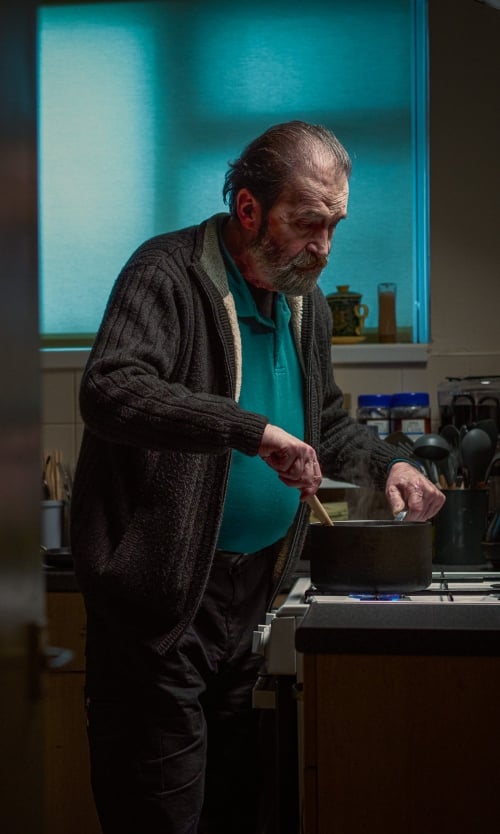
Learning to adapt and keeping positive
Terry has learned to find ways to adapt to his condition and remain independent. He belongs to a support group for a charity called myelopathy.org, which has members who live with the same condition.
Myelopathy.org is setting up a Helpline for DCM sufferers with funding from the National Lottery. It will be manned by trained DCM sufferers to provide support, but not medical advice, and Terry has volunteered to be one of those call handlers. “I'm one of the fortunate ones. My mindset allows me to adapt, and I just change my behaviour to suit my present limitations, so it doesn't affect me too badly. But many people struggle with it and get seriously depressed.”
When doing things around the house, Terry can’t stand up for very long, so he must approach housework in a particular way. He breaks cooking down into sections and uses a high kitchen chair, so that he can sometimes sit down while preparing the vegetables.
He is aware of his limitations and makes sure that things are in place to make life easier. “I know what I can't do. My humble home is full of disability aids to allow me to do what I can. Compared to the others in the support group, I'm very fortunate. I don't hire cleaners, I can cook for myself, I can keep myself reasonably clean and presentable.”
Support from Age UK
With support from Age UK, Terry has been able to secure Attendance Allowance and Pension Credit, as well as Council Tax relief and housing benefits. This help means he’s now slightly better off than when he was working five and a half days a week, which has made a big difference to his independence.
“Because I've got that financial security now, I've been able to afford the aids and rehabilitation equipment that I need to help maintain my independence.”
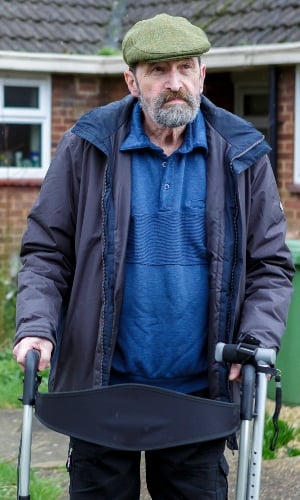
Terry now has two-wheeled walkers – one to use indoors, which has two tracks and two staggered trays on it – and a larger hybrid wheeled walker for going outside that has a seat. When he wants to do exercise, he uses a couple of tracking poles, and he has a treadmill for his rehabilitation. He has also installed grab rails throughout the property and a revolving stall in his bathroom.
Taking preventative measures
Terry is mindful of the fact that his condition will deteriorate, so he is saving money from his Attendance Allowance to buy a riser recliner chair and an adjustable orthopaedic bed, and either a mobile or C scooter or a wheelchair.
“Without the Attendance Allowance I'd never be able to afford that equipment. That would almost certainly have led to more falls and I've got to be extremely careful about that because any further damage to my neck could leave me paralysed.”
Terry must also think ahead and make sure that he has everything he needs in his home if he can’t go out. This includes ensuring he has all the provisions he may need – something he wasn’t able to do before, due to his financial struggles.
“I have to pick the days in the winter when I can go outside, because if it's slippery I'll just use my treadmill indoors. Now that I can afford to, I always keep myself well-stocked with food. So, if I am stuck indoors for a few days or more, it’s not a problem.” Terry must stay close to home and he worries that ultimately, he will face losing his independence. “Apart from hospital visits, I've not been more than 500 yards from my front door in the last 18 months. My biggest fear is ending up in a care home, so I fight very hard to keep my independence.”



